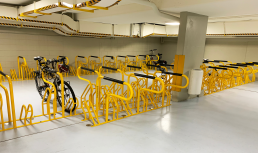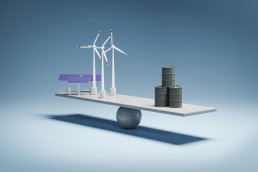More candidates look for sustainability when applying to companies and expect their employers to consider the environment in their decision-making. According to a report by Gartner, 67% of employees say sustainability is highly important, but only 16% say their organization has the knowledge and mindset to embrace sustainable practices.
There are multiple ways to invest in sustainable business practices and show your employees that you care about your environmental impact. You can work with your local municipality to get a recycling dumpster, plant native shrubs and flowers that support the bees or invest in software-designed solar solutions. You could opt for ground-mounted solar panels if you have a big campus or roof-mounted panels if your offices are located in the city.
Several possible benefits come with making your business practices more sustainable, including financial savings and help for the environment. However, these changes can also affect the well-being of your employees. Here are a few ways your sustainability efforts can impact your staff and improve your company culture.
Ethical practice
At least 64% of Americans say they are somewhat worried about climate change. Some people are seriously worried about the impact of humans on the environment and develop eco-anxiety, which is a sense of dread or stress when thinking about the future. As more people worry about the environment, they may turn to companies to step up and protect the planet. Consumers want to buy from sustainable companies and work for eco-minded employers.
Investing in sustainability can make your employees feel good about where they work and their environmental impact. This can improve their well-being by soothing their eco-anxiety. You might not be able to completely help them overcome this source of stress, but you can make your staff feel good about what they do.
Pride in company operations
If an employee feels like they work for a sustainable company, they could take more pride in where they work. Proud employees have a significant impact on a company’s profitability. These team members are twice as likely to stay at the company and six times more likely to endorse their workplace to others. This helps the company save money with reduced turnover costs while also attracting top talent to fill open positions quickly.
Employees may also feel assured that their employer cares for the environment, which could alleviate their eco-anxiety and lead to better well-being. This in turn could lead to higher rates of engagement as the employees to participate to see the company thrive.
Sense of innovation
When your company invests in sustainable practices, it signals to employees that you are willing to consider new ideas that will help the company grow in the long run. Your team members could feel more comfortable voicing their opinions and pitching new ideas for the business.
A commitment to sustainability also demonstrates that your company is cutting-edge and willing to make forward-thinking changes. This can contribute to an innovative work culture which can make your company stand out amongst the competition and encourage employees to continue evolving professionally.
Transparency
When companies invest in sustainable practices, they can become more transparent about their business operations. Transparency builds trust. Employees know that their employer isn’t hiding poor or unethical business practices that place profit over the environment.
Employees with transparent leaders are more likely to stay with those companies, lowering turnover rates. This creates more stability in the workforce and it can also result in employees feeling like they have more control in the workplace.
Adaptability
Business leaders across countless fields are highlighting the importance of adaptability. Throughout the pandemic, teams needed to be adaptable when facing office closures, supply chain issues and countless other threats to their operations. While the pandemic has long since passed, there could be a new challenge just around the corner.
Sustainability makes companies more adaptable as it can provide alternative ways for companies to do business. This can reduce the anxiety levels of employees who are faced with stressful situations.
For example, if a particular region is in the path of severe weather, other companies might worry about power outages closing down their operations. A sustainable company with solar panels and backup generators can feel confident in its ability if the power goes out.

Flexibility
Adaptability and flexibility are similar, but they are two different concepts. Adaptability refers to changing behavior as a direct result of a new situation — like taking a detour when there is an accident on the highway. Flexibility refers to embracing multiple solutions in a given situation and choosing the best one at the moment.
Sustainable practices can increase flexibility in the workplace. For example, your company might authorize teams to work remotely. This means that your team members do not have to spend money on, or use, gas to get to work. It also means that your company is using less electricity. This decision also gives your employees greater flexibility and improves their quality of life. A parent can clock in early, take a break to walk their child to the school bus and then clock back in before their morning meetings.
Job stability
Sustainable companies are forward-thinking, which can help employees feel better about their job security. When your business is looking a year, five years, or even a decade into the future, it means that it has stable operations now. When the economy becomes uncertain, your team members can feel safe that their jobs are secure.
Not only does this improve the emotional well-being of your staff, but it can also help your company grow. Your team members might be more likely to take calculated risks that could lead to greater profits or new revenue channels in the future.
Physical health
While sustainable investments can help the mental health of employees, they can also support their physical health. Here are just a few ways your investments can support your staff:
- Improving indoor air quality can reduce asthma and allergy symptoms.
- Switching to safer chemicals for the environment can also limit employee exposure to toxins that can harm the body.
- Installing bike racks can encourage employees to get a cardio workout on the way to work while reducing their gas consumption.
- Planting flowers and shrubs can clear the air and make it more pleasant to breathe.
Improving physical health also has mental health benefits. When your body feels good, your mind is more likely to be clear and ready to work.
Taking sustainable steps like installing solar panels can reduce your electricity bill and improve the environment, but these steps can also have secondary benefits. You can improve the physical, mental and emotional health of your employees, who can then give back to your organization.
You might also be interested in:
October 10, 2024
Net energy metering: how does it work and what are the benefits?
Learn about net metering, how it works and its benefits for renewable energy users and the grid.
October 9, 2024
Solar lease vs. buy: which is better?
Explore the benefits and drawbacks of leasing or owning solar panels to determine the best option for your renewable energy needs.
October 8, 2024
Solar energy vs. fossil fuels: what’s the difference?
Want to understand the differences between solar energy and fossil fuels? Explore the pros and cons, including their environmental impacts and financial considerations.
October 7, 2024
Is solar power truly renewable or nonrenewable?
Discover whether solar energy is considered renewable or nonrenewable and explore the benefits of solar power for a sustainable future.
October 6, 2024
Understanding on-grid solar systems. Powering homes and businesses
Find out how grid-tied solar systems work, their advantages and why they're popular for homeowners and businesses looking to harness solar energy efficiently.
October 4, 2024
Solar energy vs. wind energy. Pros and cons
Discover whether solar energy is considered renewable or nonrenewable and explore the benefits of solar power for a sustainable future.
October 3, 2024
Achieving household energy independence
Discover how energy independence through solar power can benefit your household, reduce costs, and contribute to a sustainable future.
October 2, 2024
Solar powered water heaters. A comprehensive guide to their value and efficiency
Many people in rural areas have difficulty accessing financial services, a problem exacerbated by energy insecurity. Solar power can help protect rural communities from energy…
October 1, 2024
Separating solar energy facts from fiction
Explore common solar energy myths and facts. Learn the truth about the efficiency, costs, and environmental impact of solar power in this guide.
September 30, 2024
Essential solar panel maintenance for peak performance
Learn key strategies for solar panel upkeep, from regular cleaning to performance monitoring. Maximize efficiency and extend system life.
September 27, 2024
Understanding smart power grid technology
Discover how smart grids modernize power systems, enhance efficiency and integrate renewable energy sources for a sustainable future.
September 26, 2024
Why do solar panels degrade?
How and why do solar panels degrade? Explore the factors contributing to their lifespan and what measures to take to extend it.
September 25, 2024
Solar panel and battery recycling
Learn effective techniques for recycling solar panels and batteries. Discover sustainable practices, legal requirements, and the environmental impact of proper disposal methods.
September 24, 2024
Will urban air transportation become widely available?
Learn about the latest innovations and practices that can further improve the sustainability of climate-resilient crops, benefiting both farmers and the environment.
September 23, 2024
Emerging innovations in unmanned systems
Unmanned systems can perform various tasks without the hands-on operation of a human, although they’re often operated remotely. These systems are increasingly being used in…














